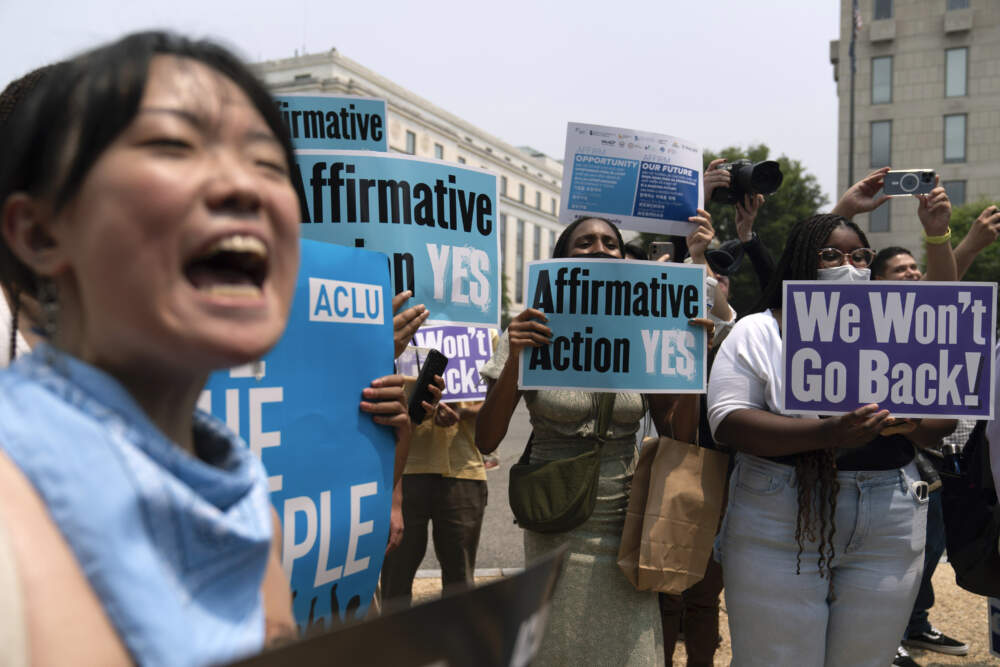Advertisement
Commentary
However imperfect, affirmative action made us better

As an Asian American who journeyed from the familiar surroundings of his local public schools to the hallowed halls of Brown University, Harvard Law School, the Kennedy School of Government, and the Yale School of Management, I have been deeply invested in the pressing dialogue around race-conscious admissions. With yesterday’s decision, the Supreme Court has handed down a ruling that will reshape the landscape of higher education for the worse.
Race-conscious admissions have been a crucial tool in our ongoing pursuit of a more equitable education system. Despite consistent challenges to the policy, college admissions officers have legally considered race as part of their decision since the 1960s, and yet minority students (and faculty) are still vastly underrepresented at top schools. In my recent joint-degree JD/MPP program at Harvard, for instance, zero of the 12 students in our cohort were Black.
At their core, race-conscious college admissions policies transcended mere quotas or percentage-based systems. The process sought to capture a more multifaceted and nuanced understanding of merit — one that looks beyond grades and test scores, embracing the rich tapestry of an individual's experiences. This approach helped level the playing field by assessing students within their unique contexts and peer groups. Now, the court has prohibited this approach to evaluating merit in the admissions context, limiting the definition of merit to an arbitrary composite of predetermined privilege and flawed quantitative measures.
This undermines the recognition that true merit is not a one-dimensional measure, but a complex interplay of factors that should encapsulate an individual's journey, their circumstances, their resilience and their unique contributions. This decision also amplifies the power of other admissions criteria that mostly benefit white college applicants, such as legacy admissions and athletic recruitment — neither of which have any basis in academic merit.
A striking finding from a 2019 study of Harvard admits revealed that a staggering 43% of white students were either legacy, athletes or related to donors or staff. These students often receive an unearned advantage — an unfair head start in the race for admission. Worse, it seems those who’ve toppled race-conscious admissions, are equally committed to papering over these unfair advantages in the admissions process. For example, Brett Kavanaugh, a Yale legacy famously, and falsely, claimed he had “no connections” to the school and was admitted as a result of his own merit. Kavanaugh just voted with the other conservative justices to gut race-conscious admissions.
As noted educator and former president of Harvard University, Drew Faust, once eloquently stated, "A diverse student body enables us to enrich, to educate and to challenge one another." Having spent a decade in the Ivy League, this was certainly my experience. Throughout my academic journey, the classmates who taught me the most were the ones who brought a diverse range of experiences and perspectives to the table.
Advertisement
This [decision] undermines the recognition that true merit is not a one-dimensional measure, but a complex interplay of factors that should encapsulate an individual's journey ...
I’ll never forget the time in my public policy class at Brown when a group of relatively privileged classmates whose parents had never struggled to put food on the table philosophically debated the benefits of SNAP (the USDA’s Supplemental Nutrition Assistance Program) only to be interrupted by a Native American student who shared her lived experience with the program, and how it shaped her own family and development. It was a perspective that added knowledge beyond what a textbook could offer and entirely shifted the class's perspective on the issue in subsequent seminars. (A separate but related conversation must be had on the extra work underrepresented students are often expected to do, as in this example, to educate their peers while navigating their own educational experience.)
Outside the classroom, too, it was the hard conversations with students from communities far different than my own that have helped shape me into the person I am today. I am most appreciative of the energetic and at times messy late-night debates over complicated issues of race, substance abuse, sexuality — debates situated in an environment that offered immediate access to new types of people and experiences.
In a world where rote memorization and basic academic skills will be supplanted by artificial intelligence and other technological advancements, the critical thinking and relationship-building skills that I honed during those difficult conversations are increasingly valuable. I worry for the next cohort of college students who may miss out on these kinds of valuable opportunities to expand their outlook as a result of the court’s obtuse ruling.
To truly internalize the value of a race-conscious approach requires us to reconsider long-held beliefs about merit and success.
Even for those inclined to embrace the value of diversity, I’ve found that my conversations surrounding race-conscious admissions have touched on a fundamental discomfort. To truly internalize the value of a race-conscious approach requires us to reconsider long-held beliefs about merit and success. It confronts us with the realities of systemic disparities and ingrained privilege. It pushes us to broaden our perspectives and to appreciate qualities such as resilience and determination, the ability to overcome adversity and the value of diverse perspectives to our academic communities. This conversation is indispensable and one we must continue to have beyond the court’s partisan rulings (6-2 for Harvard and 6-3 for the University of North Carolina).
This decision ends a practice that, while imperfect, has made significant strides toward rectifying systemic imbalances in higher education. The true strength of our academic institutions lies in their diversity — the fusion of different experiences, ideas and perspectives that drive innovation, encourage critical thinking and equip students for a rapidly evolving world.
I stand with race-conscious admissions not as a handout or a form of appeasement, but as a means to ensure a comprehensive, fairer representation of merit in the landscape of American higher education.
